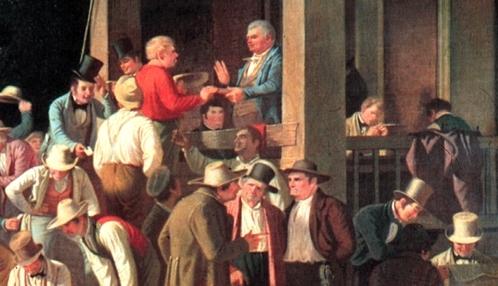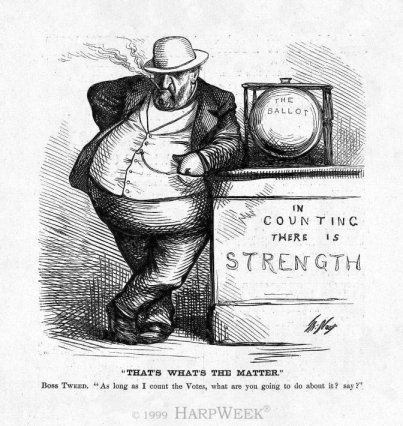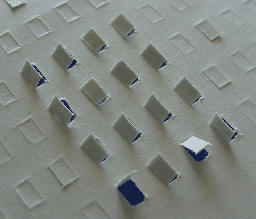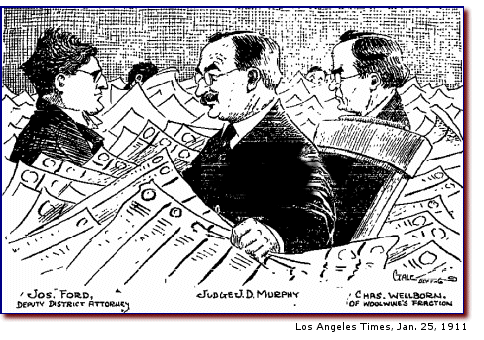
There was no right to a secret ballot; having been sworn in, the voter simply called out his choices to the election clerks who sit on the porch behind the judge tallying the vote. Each clerk has a pollbook in which he writes the voter's name and records his votes; multiple pollbooks were a common defense against clerical error. There are several people in the painting holding paper tickets in their hands. We know that these were not paper ballots because Missouri continued to use voice voting until 1863. In a general election, however, many voters might have wanted to bring their own notes to the polling place.
Douglas W. Jones, An Illustrated History of Voting
So that's how it was done in our bucolic, raucous past. I've always like the pictures of George Caleb Bingham, and I have had an especial fondness for this picture of a county election in Missouri. There's no sanctity of the voting booth here-but there's a different kind of sanctity: the sanctity of a transparent public arena. John Q. Voter declares his vote to the whole world, (well, a little corner of it anyhow), his Justice neighbor swears him in, and his neighbors the clerks record his vote next to his name. Chaos surrounds, politicking on the steps, enticements to vote one way or vote the other, and plenty of tipple to celebrate democracy.
Voices for reform of this system arose in the gilded age and eventually paper ballots, provided at the polling place and marked in private, were to replace the system Bingham painted. The reformers saw this as a way to avoid "corruption" in the forms of bribery or threats and intimidation by citizens of influence and power in the community. The anonymity of the voter was secured, and by the Roaring Twenties the paper ballot was nearly universal, whether of the partisan kind (tickets for one party only) or the ever more popular Australian kind, where all candidates for office appeared on the same ballot.
The progressive "reform" was to mend the infrastructure of the democratic system. But did it? And if not, why? I think a pretty good argument can be made that gains by the reform were pretty much balanced by significant losses: privacy was gained; but the price paid was anonymity, and with the introduction of anonymity the voter loses the ability to verify his/her vote was indeed counted and counted as the voter intended. Believing in the sanctity of my ballot becomes an act of faith on my part.

One doesn't have to go all the way back to the days of Nast and the Tweed Ring to see the problems the secret ballot and its machine variants has caused. And how are your chads hanging these days?

Chad, n. pl. [var. of CHAFF or perh. Scot. small gravel?] 1. the circular pieces of paper punched out by a paper-tape punch, as used with a teletype machine: PUNCHINGS, CHAFF, CONFETTI. 2. the pieces of cardstock punched out by a keypunch, as used with punched-card data processing: CHIPS. 3. any waste produced by a paper punch. 4. the punchings produced by a Votomatic voting device, when used with pre-scored machine readable punched-card ballots.
Douglas W. Jones, Chad Page
Can any Floridian say of a certainty that his/her ballot was counted? Can any Floridian, confused by the butterfly ballot, be assured that he/she had her vote counted as intended? Can we ascribe the roots of the Bush election in 2000 to the ballot reform measures of a century before? Deibold??? Touch screen voting machines-even with a paper trail, cannot verify that the individual votes were cast as individual voters intended.
I feel for Al Franken, and I want him in Washington A.S.A.P., if not sooner. I also feel for those Minnesotans who voted in good faith and have no way of knowing individually whether their ballot was contested and/or counted. This seems to be a pretty high price to pay for voting booth privacy. I'm wondering, too, if every scandal of this particular sort doesn't discourage persons from exercising their civic duty. When so many votes literally don't count, and there's no way to determine which votes are in that category, persons might just figure they might as well stay home.
Is voting booth privacy an issue which concerns a significant number of Americans? I don't know. I gather that there isn't overwhelming reluctance to indicate their votes in exit polls, or even to appear on television to tell the nation how their votes were cast. But this has its own problems. If the finally tally is different from the statistical predictions made on the basis of exit polling, and the pollsters do their business well, take an adequate sample, how is this to be interpreted. Voters lied? Perhaps. Votes were miscounted? Perhaps. Deliberately? Perhaps
.
 Polls Close in 1910... Contest for District Attorney's Post ContinuesBy Roger M. Grace
Polls Close in 1910... Contest for District Attorney's Post ContinuesBy Roger M. GraceLooking back, historians tend to ask a fairly standard set of questions. Did the action achieve what it was supposed to achieve? If not, were other alternatives available which could have been applied instead? If neither, are their repercussion of that action to this day? If so, is there a remedy or is the action so embedded culturally that it impossible to change.
I'm on vacation so I'll leave these questions for you to answer...I'd love to see what you folks think about this. Would you be willing to give up a degree of privacy regarding your electoral decisions in return for an iron-clad method guaranteeing that your vote had been recorded as you intended, and offering you legal recourse if that wasn't the case? If the secret ballot went awry, how can it be returned to alignment with democratic principles?



